Key takeaways
- Hip hop originated in the 1970s in the Bronx as a cultural response to social and economic challenges, evolving into a powerful medium for storytelling and community connection.
- Milestones like the release of “Rapper’s Delight” in 1979 and the rise of conscious rap in the late 1980s marked significant moments in hip hop’s journey, enhancing its impact on society.
- The genre has been shaped by diverse influences, blending elements of funk, soul, and jazz, and is marked by collaboration that enriches its cultural narrative.
- Hip hop has transcended music, influencing fashion, language, and activism, while serving as a powerful vehicle for social commentary and community expression.
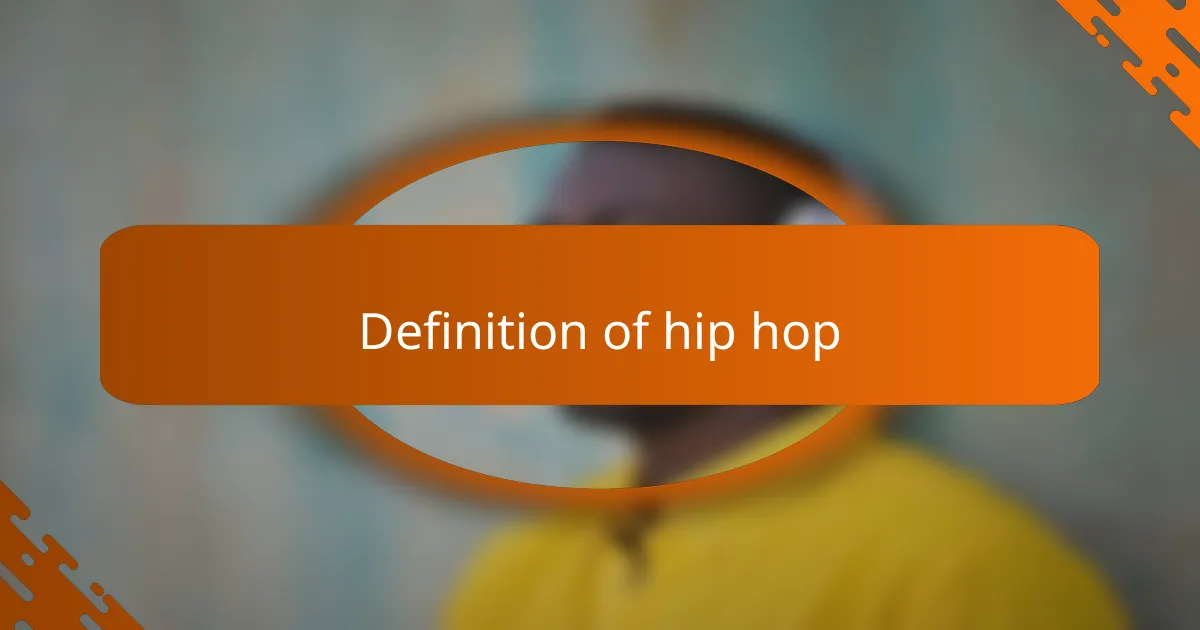
Definition of hip hop
Hip hop is more than just a genre of music; it’s a vibrant culture that encompasses a range of artistic expressions, including rap, DJing, graffiti art, and breakdancing. I remember the first time I encountered hip hop—it wasn’t just about the beats; it was about a movement, a voice for the voiceless. Have you ever felt that connection to music that resonates on a deeper level?
At its core, hip hop originated in the 1970s in the Bronx, New York, as a response to social and economic challenges. It provided a medium for young artists to share their stories, struggles, and dreams. I think that sense of community is what really sets hip hop apart; it creates a network of shared experiences that unite people from diverse backgrounds.
Defining hip hop can also involve its elements: rhythm, rhyme, and storytelling. I often marvel at how these components come together to create something so powerful. It makes me wonder—how can a few words and beats evoke such raw emotion and authenticity? This is the magic of hip hop, shaping not only music but also social conversations and cultural identities.
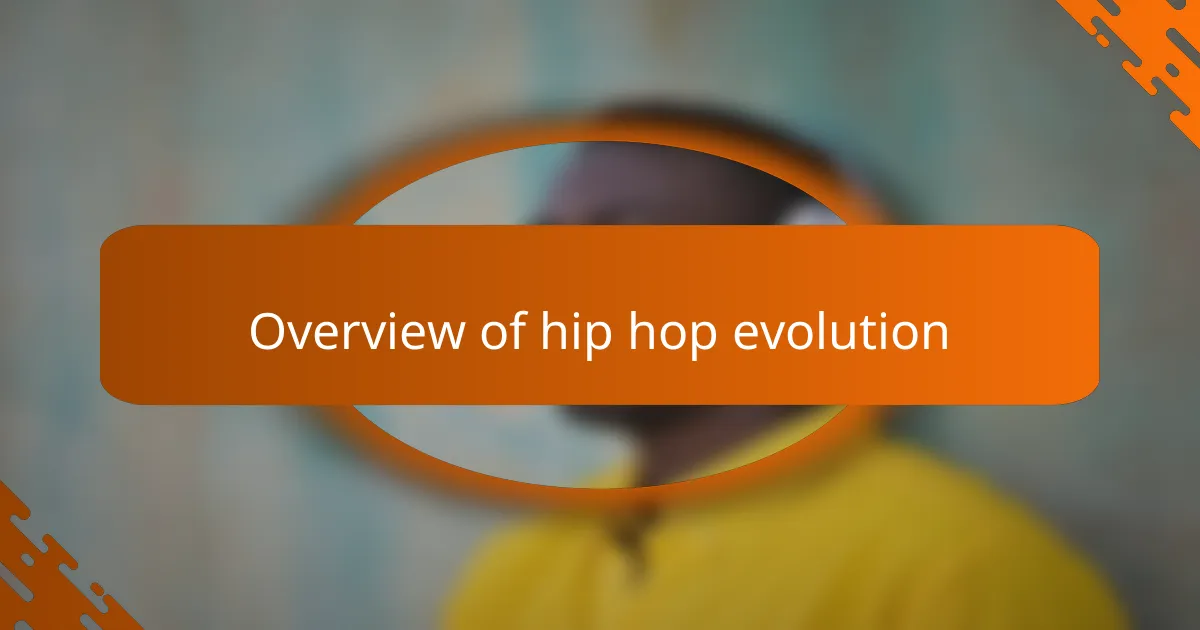
Overview of hip hop evolution
Hip hop has evolved significantly since its inception in the late 1970s. What started as block parties in the Bronx soon birthed a musical revolution that spread globally. I think it’s fascinating how hip hop transformed from a localized art form into a multi-billion-dollar industry, influencing not just music but fashion, language, and lifestyle. Can you imagine the excitement of those early gatherings, where creativity ignited something much bigger than anyone could have anticipated?
As the 1980s rolled in, we saw the rise of iconic figures like Grandmaster Flash and Run-D.M.C., who introduced new styles and themes. I remember listening to their tracks and feeling the energy—something that seemed to transcend mere entertainment. How incredible is it that these pioneers set the stage for the diverse sounds we hear today, blending various genres like funk, soul, and rock? Each artist contributed their flavor, making hip hop a melting pot of cultural influences.
By the 1990s and early 2000s, hip hop had cemented its place in mainstream culture, with artists like Tupac and Notorious B.I.G. tackling deeper social issues through their lyrics. Their music spoke not just to their lives, but also to the collective experiences of many. It’s hard not to feel a sense of loss when I think about how their stories were cut short, yet their legacies continue to inspire. Isn’t it remarkable how music can encapsulate such profound narratives, leaving an indelible mark on our society?
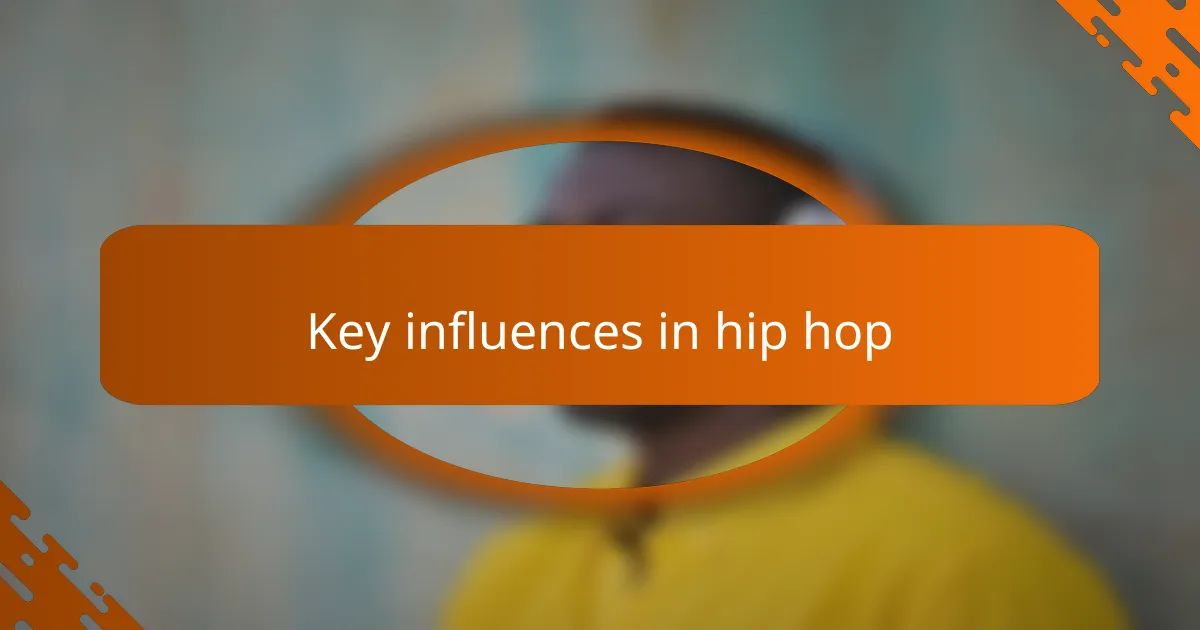
Key influences in hip hop
When I think about the key influences in hip-hop, it’s clear that the genre has been shaped by a rich tapestry of sounds and cultures. From the beats of the Bronx in the 1970s to the unique styles emerging worldwide today, every artist builds on the foundations laid by those who came before them. I remember the first time I heard Grandmaster Flash — it was a revelation that opened my mind to the storytelling power of rap.
The evolution of hip-hop is also heavily driven by elements of funk, soul, and even jazz, which have all contributed to its rhythmic complexity. Listening to A Tribe Called Quest in my youth not only resonated with my experiences but also highlighted how varied influences can create something beautifully unified. Hip-hop, at its core, is a conversation between generations and genres.
- DJ Culture: Pioneers like Kool Herc and Afrika Bambaataa were instrumental in shaping the early sound of hip-hop.
- Social Commentary: Artists like Public Enemy and N.W.A. used their platforms to address political and social issues.
- Regional Styles: Different cities, like Atlanta with crunk or the West Coast with G-funk, have contributed unique flavors to the genre.
- Technology: Advances in production software and sampling have revolutionized how artists create music.
- Collaboration: Features and cross-genre collaborations have expanded hip-hop’s reach and influence on other musical styles.
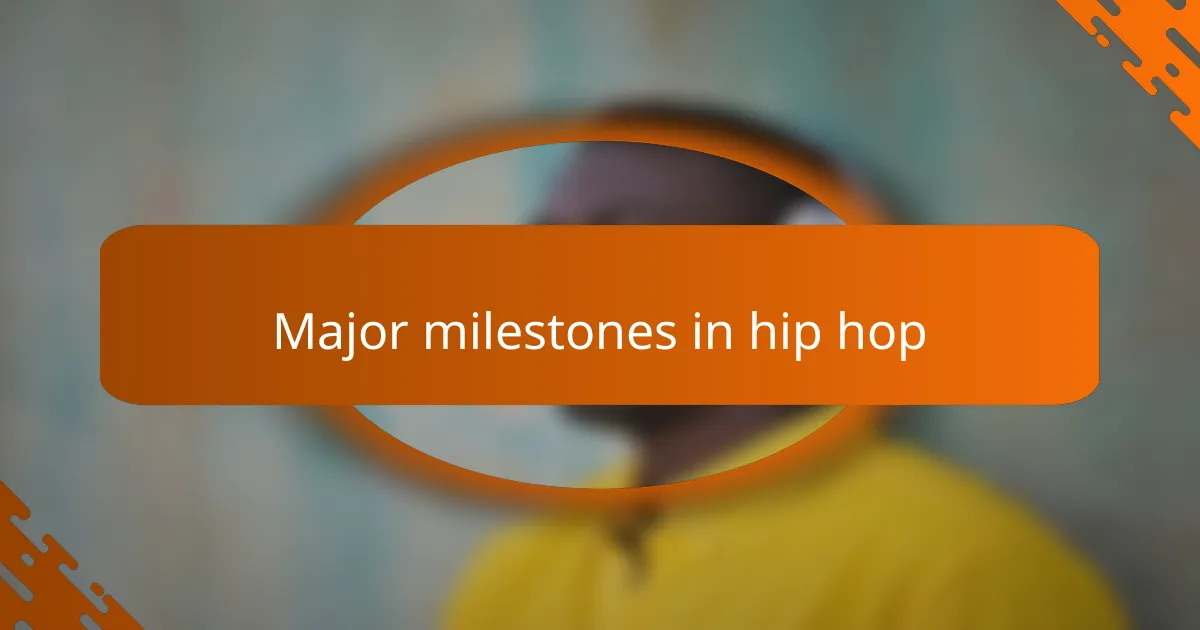
Major milestones in hip hop
The evolution of hip hop is marked by several pivotal moments that shaped its direction. One of the major milestones occurred in 1979 when the Sugarhill Gang released “Rapper’s Delight,” often credited as the first hip hop hit to gain mainstream attention. I remember hearing that track for the first time; there was an undeniable energy in the air that made it feel revolutionary. It helped to solidify hip hop’s presence in the music landscape, inviting audiences to embrace something that was previously unheard.
Fast forward to the late 1980s, and we witnessed the emergence of conscious rap through groups like Public Enemy. Their album, “It Takes a Nation of Millions to Hold Us Back,” challenged listeners to think critically about societal issues. I often reflect on the impact of their powerful lyrics and the sense of urgency they conveyed. Can you feel the way their music compelled a generation to engage with social justice like never before? It was a true awakening that energized the hip-hop community and sparked important conversations.
The turn of the millennium brought another turning point with the rise of the internet and digital platforms. Artists began to share their music independently, breaking traditional barriers and shifting the industry’s landscape. I recall exploring online platforms and discovering new voices that had previously gone unheard. Hasn’t it changed the game entirely? This democratization of music allowed for diverse perspectives to flourish, proving that hip hop continues to evolve and reflect the ever-changing tapestry of our world.
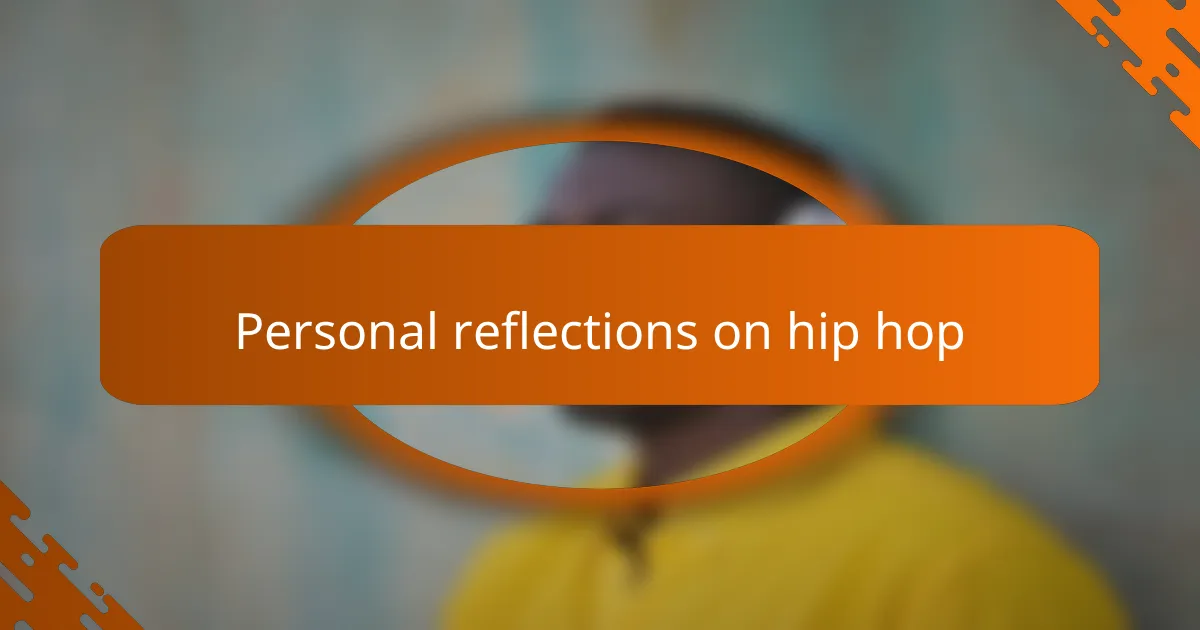
Personal reflections on hip hop
When I think about my personal journey with hip-hop, I can’t help but reflect on how it has shaped my perspectives and emotions over the years. I remember first hearing artists like Nas and Wu-Tang Clan in my teenage years; their lyrical depth resonated with me and opened my eyes to the complexities of life. Hip-hop has been more than just music; it has been a narrative of struggle, resilience, and empowerment that speaks to the core of human experience.
Moreover, I appreciate how hip-hop has continually evolved, embracing different styles and influences. It’s fascinating to witness the blend of traditional beats with modern sounds, creating an innovative culture that transcends generations. Here are some aspects of hip-hop’s evolution that have personally impacted me:
- Diversity of Voices: From old-school legends to today’s artists, the variety of perspectives has expanded my understanding of different cultures and experiences.
- Social Commentary: Many hip-hop tracks serve as powerful commentaries on societal issues, prompting me to think critically about my environment.
- Collaborative Spirit: The way artists collaborate across genres has enriched my appreciation for music, showing that creativity knows no boundaries.
- Cultural Impact: Hip-hop has transcended music to influence fashion, language, and even activism, highlighting its role as a cultural movement.
- Personal Growth: Listening to hip-hop has accompanied my personal growth, guiding me through both challenges and celebrations in my life.
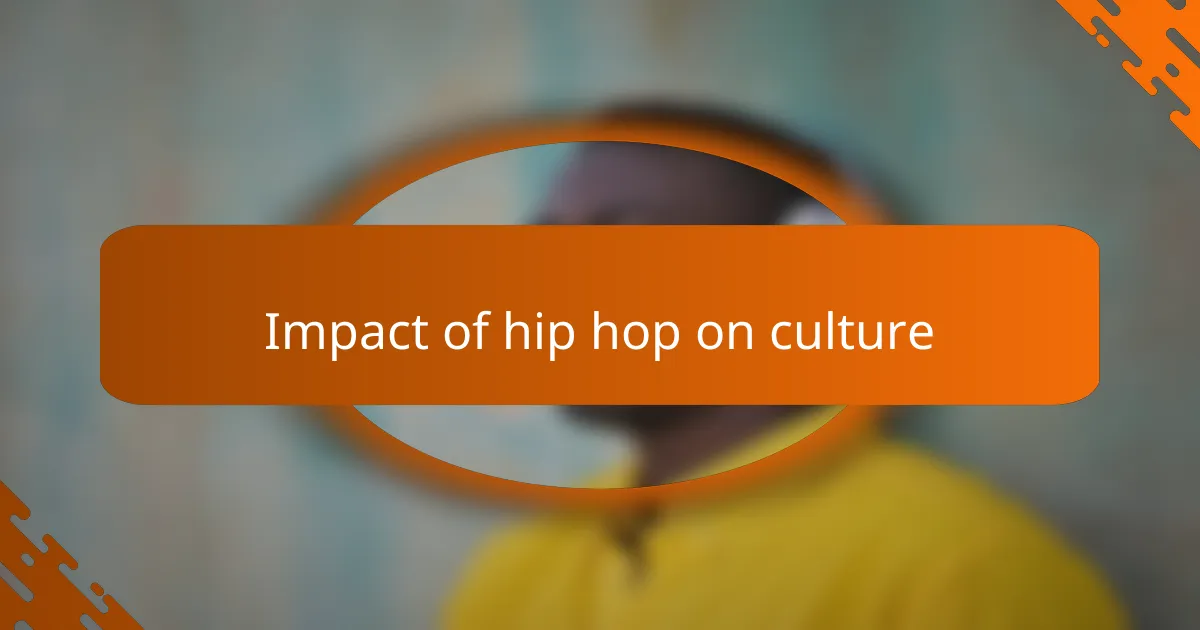
Impact of hip hop on culture
Hip-hop has profoundly influenced culture in ways that extend far beyond music. Growing up in a neighborhood that embraced hip-hop, I remember street corners buzzing with creativity as kids shared their own rhymes and breakdance moves, creating a sense of community and belonging. It’s incredible how this genre can transform not just personal identity but also societal norms and perspectives.
Additionally, hip-hop has been a powerful microphone for voicing social issues, often highlighting stories that mainstream media overlooks. Artists like Kendrick Lamar and J. Cole bring authenticity and raw emotion to their lyrics, challenging listeners to reflect on their own lives and the world around them. This genre serves as a bridge, connecting diverse backgrounds through shared experiences and emotions.
- Hip-hop has shaped fashion trends, from baggy jeans to streetwear brands.
- It has introduced unique slang and linguistic styles that have permeated everyday language.
- The genre fosters creativity, inspiring art forms like graffiti and dance.
- It often addresses social justice themes, provoking conversations on inequality and race.
- Hip-hop has contributed to global unity, with artists collaborating across borders, sharing diverse cultural narratives.